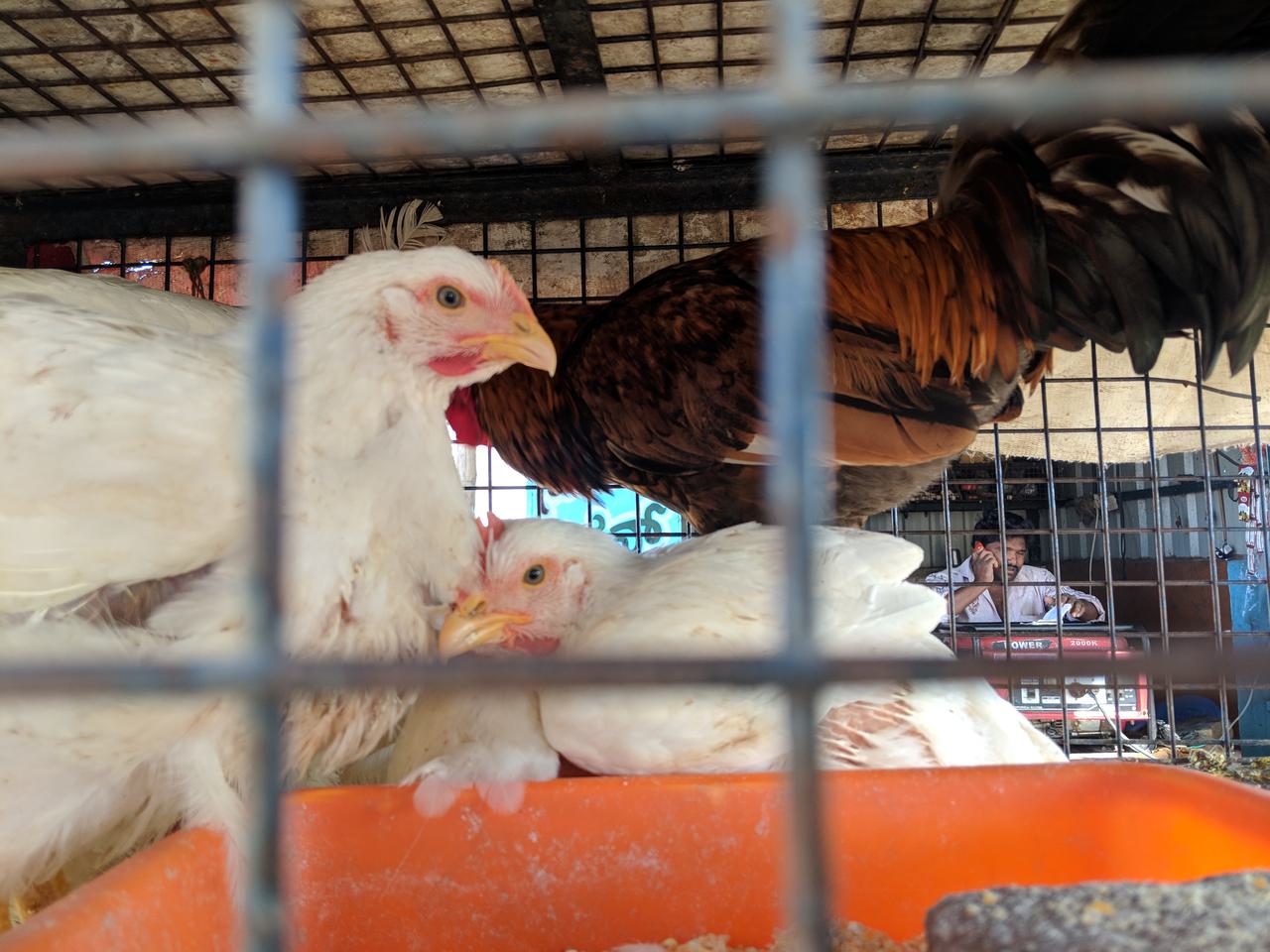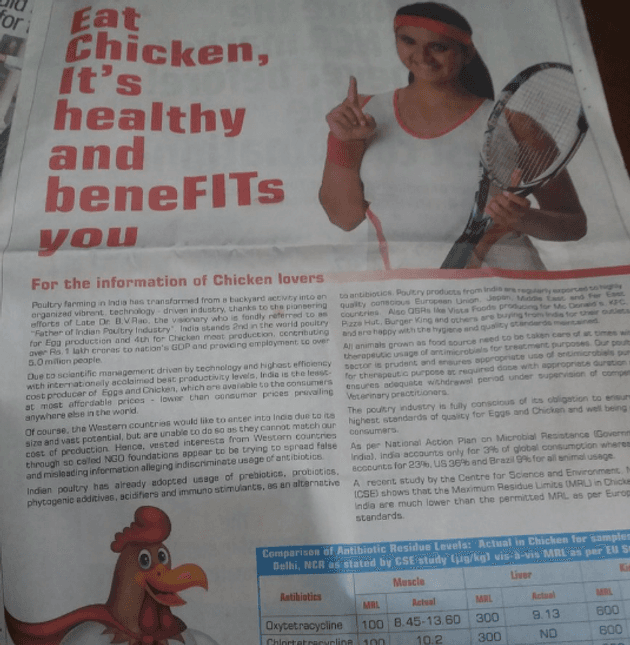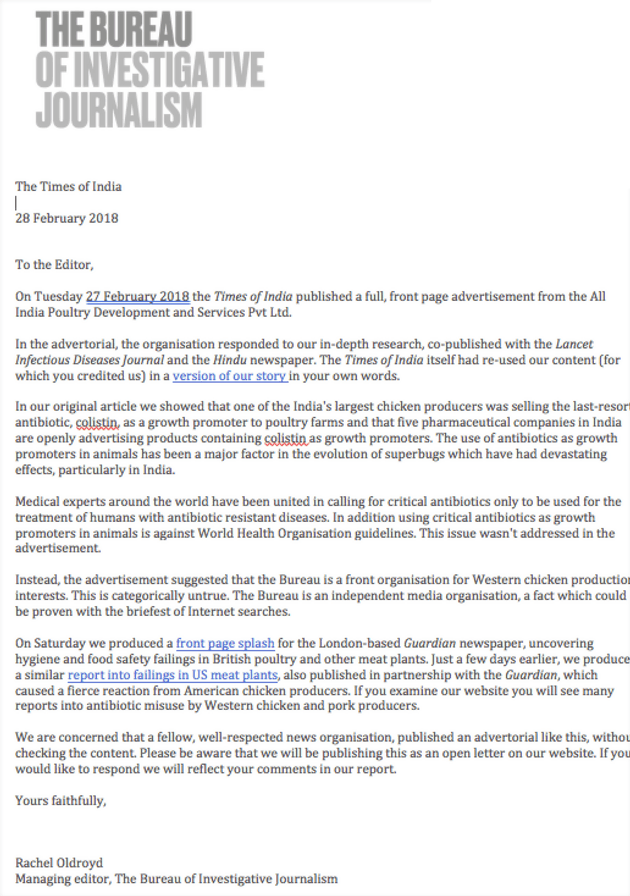
We stand by our story: They were marketing critical antibiotics as growth promoters to farmers
The Times of India published a front page advertisement by Indian poultry representatives challenging our story - here's our take
The Indian chicken industry has taken out a full front page advert in India’s largest English speaking newspaper, claiming a story about the use of critically important antibiotics on poultry farms was written on behalf of Western countries wanting to break into the market.
The All India Poultry Development and Services Pvt Ltd, a subsidiary of the Venky's VH group, which is one of the biggest poultry producers in the country, bought the advert in the Delhi edition of The Times of India. It challenged an investigation in January by the Bureau of Investigative Journalism.
The Bureau's story revealed at least five companies within India, including Venky's, were actively marketing products containing the 'last-resort' antibiotic, colistin, to poultry farms to make chickens grow fatter.
This practice is against World Health Organisation guidelines as it leads to the evolution and spread of colistin-resistant bacteria, which can cause fatal infections in humans.
The investigation also showed hundreds of tonnes of colistin were imported to India in 2016 and 2017, with two companies manufacturing the drug in India.
It was written with Indian journalist Rahul Meesaraganda and published with the Lancet Infectious Diseases medical journal and the Hindu newspaper. It was widely republished by other news organisations, including The Times of India.
The Bureau newsletter
Subscribe to the Bureau newsletter, and hear when our next story breaks.
India is facing a drug resistance crisis, with doctors reporting cases of multi-drug-resistant infections every week. At least 58,000 newborns die in India of infections resistant to antibiotics every year.
The All India Poultry Development and Services Pvt Ltd did not respond to the revelations that colistin was being sold as a growth promoter but instead accused the Bureau of working on behalf of Western food companies hoping to enter into the Indian market.
The advert said: “Of course, the Western countries would like to enter into India due to its size and vast potential, but are unable to do so as they cannot match our cost of production.”
 Screenshot of advert carried by The Times of India
Screenshot of advert carried by The Times of India
It continued: “Hence, vested interests from Western countries through so called NGO foundations appear to be trying to spread false and misleading information alleging indiscriminate usage of antibiotics.”
In fact the Bureau is an independent, not-for-profit news organisation free from corporate or political influence. Its editor has written to the poultry industry body and The Times of India, denying the claims made in the advert and emphasising the original story was accurate. You can view the Bureau's letter to the newspaper below.

Make change possible
Investigative journalism is vital for democracy. Help us to expose injustice and spark change
Click here to support usThe advert also publishes the results of a 2014 study by the Delhi-based Centre for Science and Environment (CSE), which found the residues of six antibiotics used widely in poultry (which did not include colistin) in muscle, liver and kidney poultry meat.
The residue levels were comparable to those permitted in EU states and the advert cites this as proof that allegations of widespread antibiotic use on farms were ‘baseless’.
However, CSE has published a strong rebuttal on its website, saying the poultry body’s use of the study is a “clear misrepresentation of facts” and “uses the findings incorrectly to suggest no misuse of antibiotics in the poultry sector”.
“All CSE studies have pointed out that there is rampant antibiotic misuse by the poultry industry”, its press release added.
The Bureau has been investigating antibiotic resistance and food and farming issues for two years.
Last week its front page story in the Guardian revealed major food safety breaches in 60% of audited British meat processing plants and cold stores. This followed a story, also published with the Guardian, revealing unpublished inspection reports from US meat plants and showing shocking hygiene failures.
Previous stories by the Bureau include an investigation that showed pigs infected with the superbug MRSA can be freely imported into the UK due to regulatory loopholes, after tests found the bacteria in pork sold in British supermarkets.
Another revealed soaring use of fluoroquinolones, a class of antibiotic essential in human medicine, on British farms. This story forced the industry to publish data on use a year later.
Header photograph, of Indian poultry, by Rahul Meesaraganda


